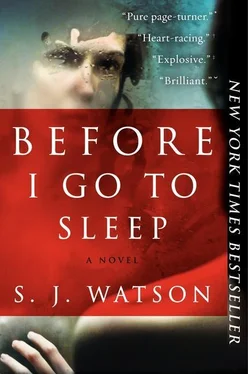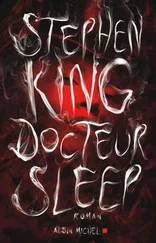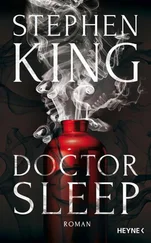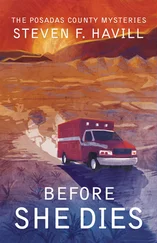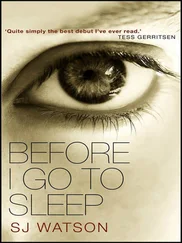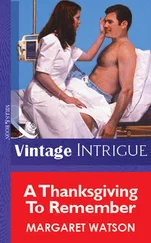“Yes,” I said. He waited again.
“I didn’t call this morning. I didn’t tell you where it was.”
I realized it was true. I had gone to the closet myself and, though I did not know what I would find inside it, I found the shoebox and opened it almost without thinking. I had found it myself. As if I had remembered it would be there.
“That’s excellent,” he said.
* * *
I am writing this in bed. It is late, but Ben is in his office, across the landing. I can hear him work, the clatter of the keyboard, the click of the mouse. I can hear an occasional sigh, the creak of his chair. I imagine him squinting at the screen, deep in concentration. I trust that I will hear him switch off his machine in readiness for bed, that I will have time to hide my journal when he does. Now, despite what I thought this morning and agreed with Dr. Nash, I am certain that I don’t want my husband to find out what I have been writing.
I talked to him this evening, as we sat in the dining room. “Can I ask you a question?” I said, and then, when he looked up, “Why did we never have children?” I suppose I was testing him. I willed him to tell me the truth, to contradict my assertion.
“It never seemed to be the right time,” he said. “And then it was too late.”
I pushed my plate of food to the side. I was disappointed. He had got home late, called out my name as he came in, asked me how I was. “Where are you?” he’d said. It had sounded like an accusation.
I shouted that I was in the kitchen. I was preparing dinner, chopping onions to fry in the olive oil I was heating on the stove. He stood in the doorway, as if hesitant to enter the room. He looked tired. Unhappy. “Are you okay?” I said.
He saw the knife in my hand. “What are you doing?”
“Just cooking dinner,” I said. I smiled, but he did not reciprocate. “I thought we could have an omelet. I found some eggs in the fridge, and some mushrooms. Do we have any potatoes? I couldn’t find any anywhere, I—”
“I had planned for us to have pork chops,” he said. “I bought some. Yesterday. I thought we could have those.”
“I’m sorry,” I said. “I—”
“But no. An omelet is fine. If that’s what you want.”
I could feel the conversation slipping, down into a place I didn’t want it to go. He was staring at the chopping board, above which my hand hovered, clutching the knife.
“No,” I said. I laughed, but he did not laugh with me. “It doesn’t matter. I didn’t realize. I can always—”
“You’ve chopped the onions now,” he said. His words were flat. A statement of fact, unadorned.
“I know, but… We could still have the chops?”
“Whatever you think,” he said. He turned around, to go into the dining room. “I’ll set the table.” I did not answer. I did not know what it was that I had done, if anything. I went back to the onions.
Now we sat opposite each other. We had eaten in near-silence. I had asked him if everything was okay, but he had shrugged and said that it was. “It’s been a long day,” was all he would tell me, adding nothing but “at work,” when I looked for more. Discussion was choked off before it had really begun, and I thought better of telling him about my journal and Dr. Nash. I picked at my food, tried not to worry—after all, I told myself, he is entitled to have bad days, too—but anxiety gnawed at me. I could feel the opportunity to speak slipping away, and did not know whether I would wake tomorrow with the same conviction that it was the right thing to do. Eventually, I could bear it no longer. “But did we want children?” I said.
He sighed. “Christine, do we have to?”
“I’m sorry,” I said. I still didn’t know what I was going to say, if anything. It might have been better to just let it go. But I realized I could not do that. “It’s just that the oddest thing happened today,” I said. I was trying to inject levity into my voice, a breeziness I did not feel. “I just thought I’d remembered something.”
“Something?”
“Yes. Oh, I don’t know…”
“Go on,” he said. He leaned forward, suddenly eager. “What did you remember?”
My eyes fixed on the wall behind him. A picture hung there, a photograph. Petals of a flower, close up but black-and-white, with beads of water still clinging to them. It looked cheap, I thought. As if it belonged in a department store, not someone’s home.
“I remembered having a baby.”
He sat back in his chair. His eyes widened, and then closed completely. He took a breath, letting it out in a long sigh.
“Is it true?” I said. “Did we have a baby?” If he lies now, I thought, then I don’t know what I will do. Argue with him, I suppose. Tell him everything in one uncontrolled, catastrophic outpouring. He opened his eyes and looked into mine.
“Yes,” he said. “It’s true.”
He told me about Adam, and relief flooded me. Relief, but tinged with pain. All those years, lost forever. All those moments that I have no memory of, that I can never get back. I felt longing stir within me, felt it grow, so big that I felt it might engulf me. Ben told me about Adam’s birth, his childhood, his life. Where he’d gone to school, the Nativity play he’d been in; his skills on the soccer field and the running track, his disappointment in his exam results. Girlfriends. The time an indiscreet roll-up had been mistaken for a joint. I asked questions and he answered them; he seemed happy to be talking about his son, as if his mood was chased away by memory.
I found myself closing my eyes as he spoke. Images floated through me—images of Adam, and me, and Ben—but I couldn’t say whether they were memories or imaginings. When he finished, I opened my eyes and for a moment was shocked at who I saw sitting in front of me, at how old he had become, how unlike the young father I had been imagining. “But there are no photographs of him,” I said. “Anywhere.”
He looked uncomfortable. “I know,” he said. “You get upset.”
“Upset?”
He said nothing. Perhaps he did not have the strength to tell me about Adam’s death. He looked defeated, somehow. Drained. I felt guilty for what I was doing to him, what I did to him, every day.
“It’s okay,” I said. “I know he’s dead.”
He looked surprised. Hesitant. “You… know?”
“Yes,” I said. I was about to tell him about my journal, that he had told me everything before, but I did not. His mood still seemed fragile, the air tense. It could wait. “I just feel it,” I said.
“That makes sense. I’ve told you about it before.”
It was true, of course. He had. Just as he had told me about Adam’s life before. And yet, I realized, one story felt real and the other did not. I realized that I did not believe that my son was dead.
“Tell me again,” I said.
He told me about the war, the roadside bomb. I listened, as calmly as I could. He talked about Adam’s funeral, told me about the salvo of shots that had been fired over the coffin, the Union Jack that was draped over it. I tried to push my mind toward memories, even ones as difficult—as horrific—as that. Nothing would come.
“I want to go there,” I said. “I want to see his grave.”
“Chris,” he said. “I’m not sure…”
I realized that, without memory, I would have to see evidence that he was dead, or else forever carry around the hope that he was not. “I want to,” I said. “I have to.”
I still thought he might say no. Might tell me he didn’t think it was a good idea, that it might upset me far too much. What would I do then? How could I force him?
But he did not. “We’ll go on the weekend,” he said. “I promise.”
Читать дальше
